4 Factors to Consider When Selecting an Audio Interface

Whether you’re a singer-songwriter, a member of a church band, or a podcaster, you’ll probably need an audio interface in order to achieve professional audio quality. This hardware adds to the audio processing power of your computer and allows you to connect several microphones, instruments, or digital sound options at once. Shopping for an audio interface can be a little intimidating, so here's a look at how to choose the right option based on your needs.
What to Look for in an Audio Interface
1. Number of Inputs & Outputs
Start your search by making a list of all the equipment you’ll want to hook up to your audio interface. Will you be recording just a few different microphones, a guitar and vocals, or a full band featuring bass and drums? Take into account the maximum number of inputs you’ll be looking for at one time, and look for options that satisfy these needs.
Pay attention to outputs, too, since you need to hook up monitors or headphones. You might be tempted to buy an interface with fewer ports in order to save money, but this will greatly reduce the functionality of your device.
2. Price
Determine how much you’re able to pay for an audio interface. However, it’s best to focus on your needs and then work backward. Once you've narrowed down your choices based on desired functionality, the price can be the deciding factor. Compromising based on budget alone may lead to frustrations down the road.
3. Connectivity Options
.RUhoWMGGe.jpg)
Check your computer and determine what types of ports you have. These may include USB 2.0, USB 3.0, FireWire, Thunderbolt, or PCIe. You’ll need to pick an audio interface that can be easily hooked up.
The most common way to do this is with a USB port. If you plan to have these ports occupied by other devices, you can either attach it using another port or get a device that will expand your number of available connectivity options.
4. Sound Quality
Consider sound quality near the end of the decision-making process for your professional audio equipment. While premium audio interfaces offer slightly better sound, most will sound pretty good and will be sufficient for amateur needs.
However, if you’re worried about how your interface will sound, take into account the bit depth and sample rate. A higher bit depth will help eliminate background noise, and a higher sample rate will improve your overall recording quality. When in doubt, it can be a good idea to pay more for better quality to avoid needing to upgrade in the near future.
Claiborne Sharp Professional Audio will design and install first-class systems to fit your specific needs. Located in Shreveport, LA, they’ve been serving the community since 1989, offering sound systems for churches, schools, and other businesses. They'll help you pick out the perfect audio interface with their extensive experience. Visit them online or call (318) 861-5953 to schedule an audio installation appointment today.
About the Business
Have a question? Ask the experts!
Send your question

